With the news that much of the work on the new Fleet Solid Support Ships might be done abroad, the Scottish National ran an article claiming that this “risks the future of thousands of Scottish shipbuilding”.
While this would risk jobs elsewhere in the UK and is something we have campaigned against, there are no Scottish shipyards planning on taking part in this work so it’s hard to see how any jobs in Scotland could be at risk, but moving on…
This article is a fact checking article, if you believe we’ve made an error you can submit a correction in line with our correction policy.
Quoted in the aforementioned article, SNP MSP Stuart McMillan said:
“Boris Johnson unveiled a new shipbuilding strategy less than a month ago and already it looks like it’s holed under the waterline. This contract would help safeguard the livelihoods of many highly-skilled Scots workers. If the contracts go abroad it would be devastating for the yards and the local communities.
We’ve been here before. Once again, the Westminster government makes promises to Scottish yard workers only to be let down. In 2014 the anti-independence argument was that jobs would be lost on the Clyde if Scotland voted for Independence. They promised 13 new warships would be built. But, following the vote, that number has reduced to eight ships. What the supporters of Westminster control warned would happen if Scotland voted for independence actually happened as a result of Scotland NOT voting for independence.
These new deep and very real concerns over the future of Scotland’s naval yards from unions and industry analysts is simply the latest incarnation of broken Tory promises. They can’t be trusted with the future of Scotland. Next month Scotland has the chance to send another message to deceitful Boris Johnson and his Tory broken promises by voting SNP on May 5.”
The issue? The claim in bold is factually inaccurate.
As you read this, there are 13 warships in build or being procured at Scottish shipyards. That 13, by the way, is not counting the now built 5 Offshore Patrol Vessels, the planned Type 32 Frigates or the planned Ukrainian Naval vessel.
During the run-up to the 2014 Scottish independence referendum, political campaigners hoping that Scotland would remain part of the United Kingdom made a big deal about the then-planned thirteen Type 26 Frigates the Clyde was to build. Those Type 26 Frigates ended up delayed, of course, and to fill the gap one batch of two and another batch of three Offshore Patrol Vessels were ordered to keep the workforce skilled and employed.
Then the 2015 Strategic Defence and Security Review came, and long story short it resulted in the change from thirteen Type 26 frigates to eight Type 26 Frigates to be built at Govan and five Type 31 frigates to be built at Rosyth. Due to commercial considerations, budget issues and a delay to work starting on the new frigates… thirteen ships at one yard became eighteen at two yards.
More work for more people at more locations, that’s a good result isn’t it? The shipbuilders seem to think so. I spoke to a contact who wishes to remain anonymous, he told me:
“This is great for the industry, a second yard building complex warships keeps more people in work and sets the yards up for larger programmes of follow-on work. It’s no secret that we’ll likely be building the Type 45 replacement, we’ve got work for decades and now so does Babcock at Rosyth.”
Well, if all is so good why am I writing this? Because despite this information being easily verifiable and heavily reported, people seem unaware of it. A good example would be the comments under any shipbuilding article we publish. Even in response articles detailing which ship will be built where, when the contract was signed, what type it is etc we’ll still get comments repeating one of the myths from people that haven’t read the article.
‘We were told this in 2014!’, ‘The ships were cancelled!’ or ‘More lies from Wastemonster’, anyone? For more on those myths, have a look here. It’s a list of the most common ones I encounter.
Westminster routinely bungle defence projects, look no further than Ajax, but military shipbuilding in Scotland is going relatively well.
So, why is this happening?
Jonathan Chartier, a defence commentator, took a detailed look at this. He said that one key issue that has had significant influence over the often torrid debate when it comes to military ship building in Scotland is the reduction of the Type 26 procurement from thirteen to eight vessels.
The danger of politicising military shipbuilding in Scotland
“The often passionate arguments from those who support and oppose Scottish independence makes a balanced view of military ship building in Scotland and its future difficult as it can often end up with people shouting their ‘preferred’ facts at each other over social media rather then examining the issues. With warship construction consolidated on the Clyde Type 26 was projected to be a build of thirteen vessels again through multiple batches in keeping with common practice, for those familiar with military ship building the thirteen projected was at best a placeholder subject to change.”
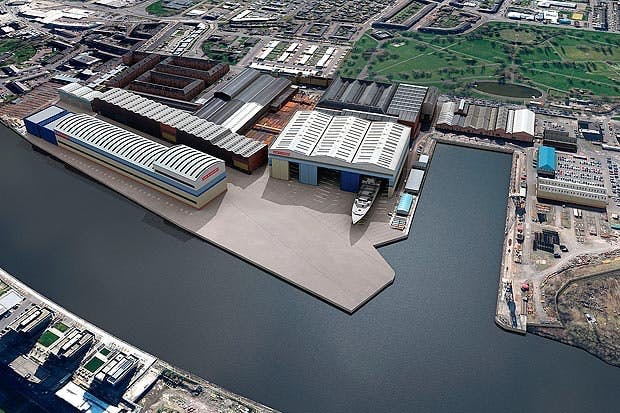
“Certainly it was well known in the period after the 2010 Strategic Defence and Security review it was clear that the equipment programme was again coming under extreme financial pressure again. In that circumstance it was unfortunate with a Scottish Independence referendum in the running David Cameron and the Better Together campaign unwisely turned routine procurement that could be subject to change into a political football by making it a direct promise to Scotland; thirteen Type 26 Frigates would be built on the Clyde alongside a new ‘Frigate Factory’. The Labour Party exacerbated the situation with a leaflet spelling out that if Scotland remained in the Union it would get 13 Type 26 frigates. The Prime Minister and other Ministers plus representatives of the Better Together Campaign regularly spelled out that a Scotland in the Union would be getting thirteen Type 26.”
Chartier explains where the idea that promised have been broken has come from.
“So when the referendum was over and won for Better Together, the reality that Thirteen Type 26 was not deliverable within the allocated budget set in. A few months after cast iron guarantees for thirteen Type 26, the order was cut to eight as part of the 2015 Strategic Defence and Security with a compensatory order for five General Purpose frigates proffered and some Offshore Patrol vessels ordered in their place.
Considering what was promised in very clear terms by the Prime Minister, Better Together and other Parties including Labour it is understandable why Scottish Nationalists have fixated on it as a totemic issue. Put simply thirteen Type 26 was a core promise by Better Together in the Independence campaign that has been, technically, broken. Of course the more nuanced point to be considered is that Scotland gained five River class Batch II Offshore Patrol Vessels and five Type 31 Frigates (plus a ‘frigate factory’ in Rosyth) as compensation for the loss. For a look at what Scottish shipyards are planning on building, this UK Defence Journal article goes into detail.”
He concludes, “Sadly this angry debate is set to continue with accusation, counter accusations and many a myth spun but in all this it does show the danger of politicising military shipbuilding”.
The change from thirteen Type 26 to eight Type 26, framed as a broken promise by some, has grown arms and legs and turned into the claim that no ships are being built in Scotland. People are, sadly, so confident of this that even in response to a photo of a ship being built on the Clyde… they are keen to argue that no ships are being built on the Clyde.
It seems very clear that social media, rather than the people using it, is to blame.
Social media encourages echo-chambers in which confirmation bias runs rampant. Essentially, people are shown news items that confirm what they already believe. Our social media feeds are personalised based on past clicks and likes behaviour, so we mostly consume political content that are similar to our views.
Without realising it, we develop tunnel vision.
Rarely will our comfort zones expose us to opposing views, and as a result we eventually become victims to our own biases. There are some studies that measure echo chamber effects, such as the study of Bakshy et al. (2015). In this study, they found that people tend to share news articles they align with. In addition to this, they discovered a homophily in the friendships online, meaning people are more likely to be connected on social media if they have the same political ideology.
This isn’t unique to Scotland, or shipbuilding, or any political party. It is a symptom of how social media influences debate. I don’t know how to fix it, I only know that it should be fixed.


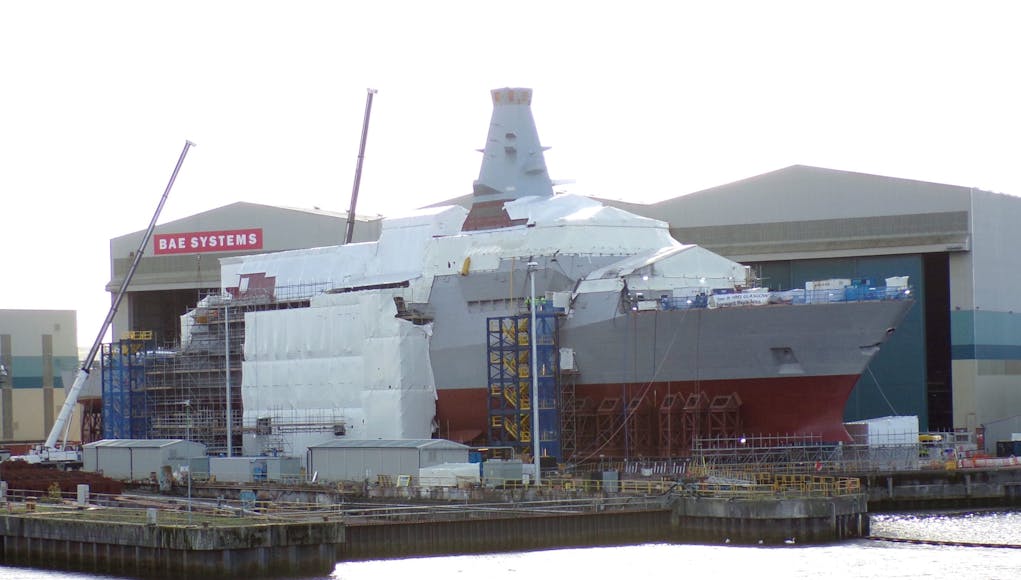
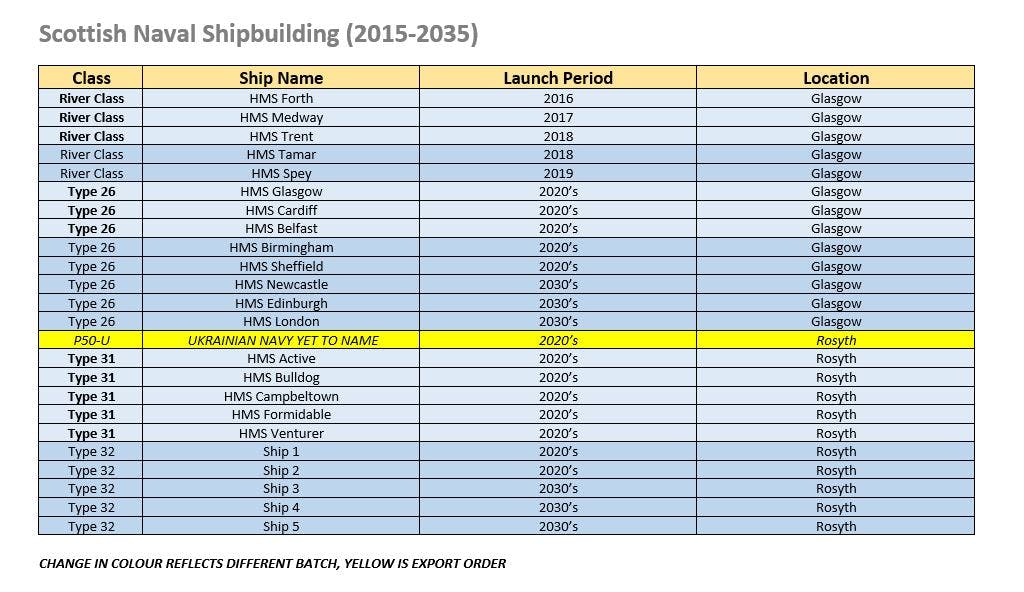


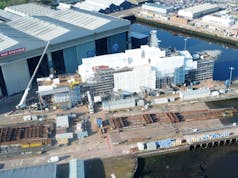


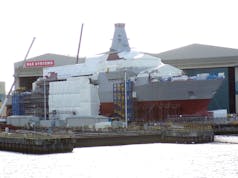

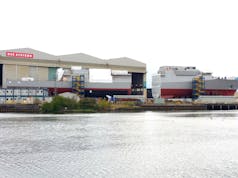


shouldn’t we consider the Scottish National as a disinformation outlet at best and a borderline propaganda outlet at worst
Never read the thing to be honest. Only print paper I look at is the metro on the odd occasion I’m on public transport.
Stuart McMillan is so dimwited he probably doesn’t know who signed the ferry contract for Ferguson, but in fairness it was so so so so long ago and that SG have just ordered 2 ferrys from Turkey.
This is is typical misinformation. FSS will be subject to an ongoing bidding process. The SOS for Defence has already called the FSS a warship so it will be constructed in the UK. Bits will no doubt be supplied fro abroad because to UK does not have the capability anymore to source all equipment necessary. The real issue is the RFA is going to have to wait another 6-8 yrs before they see a new and much needed ship. These ship should have been in service in 2016 but civil servants, Mod and politicians from both sides of the fence could or would not make the correct decision. In my view we should have taken the MSC TAKE’s as the bedrock design.
I don’t know why ship building is such a HUGE issue. Maybe 80 years ago when 10,000s were employed in it but now it’s not really the heart of Glasgow workforce.
I’m not undermining the importance of the shipyard for local employment etc or the skills the workers possess.
I just feel it’s a way bigger issue than it should be. Sooner it’s out the headlines the better. Let the yards get on with building the best they can and not give them an inflated sense of importance. That could lead to overpriced ships as the yard sees its self as to big to fail and will always get the contract.
On the other point of no Scottish yards bidding for the fleet solid support ships just shows how little shipbuilding capacity there is left in Scotland for those types of ships. Let’s hope another yard in the U.K. is able to deliver what’s needed.
It isn’t a huge issue, but the SNP need wedge issues to demonise the UK. Some SNP MPs don’t know anything else.
At present they also need distractions to hide the hundred million, or a quarter of a billion or whatever the amount was tipped away on mismanaging ferries. I hadn’t realised that the said contracts had left out industry standard customer protection clauses.
Con and Lab Leaders actually did quite a good performance at FMQ recently holding Sturgeon to account on 31 March. At the start, here:
https://www.bbc.co.uk/iplayer/episode/m0016073/politics-scotland-first-ministers-questions-31032022
Exactly. It is way too small and needs to grow! No one yard is bidding for the contract. Over priced ships? National Audit Office would see to that. Departments in Government know shipbuilding prices from the UK. Don’t forget huge tax claw back when made in the UK.
Well, no surprise there as this publication openly supports Scottish independence. It is just a confirmation bias echo chamber for the Nationalists
….ignore…
Once again utter BS from the SNP who have no interest in facts but to create more anti Uk properganda and i suppose those with an axe to grind will swallow it hook line and sinker and these people run a country What